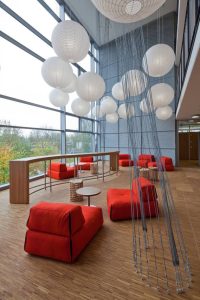Peter Hopcroft (Uni. Birmingham, UK)
Conditioning a climate model with paleoclimate reconstructions so that it resolves a tipping point
The ‘Greening’ of the Sahara during the Holocene is a particularly dramatic natural environmental change. Although it is well understood that the slow variations in Earth’s orbit caused this transition, climate models have largely failed to convincingly reproduce it. Having conditioned one climate model with the climatic state in North Africa for the mid-Holocene at 6000 years ago, we performed a series of transient simulations covering the last 10,000 years. The results show abrupt changes that replicate features seen in long paleoclimate records. We will discuss how this approach differs from other paleoclimate modelling studies, how the results are sensitive to a range of climatic forcings operating during this time. We’ll conclude with a brief discussion of how this may approach might be applied in other settings.
This is a TiPES webinar. Please contact Giulia Petitta for the Zoom link: giulia.petitta@amigoclimate.com
This is Scientific Course #2 (SC2) for the CriticalEarth ITN: An Expert Course on Climate Time Series Analysis and Risk Analysis, that will be run and organised by Manfred Mudelsee from Climate Risk Analysis (CRA).
The SC2 course will thus be conducted online from the 18-22nd April, although a the organiser will make it available to you two weeks before the workshop.
This online course takes the form of recorded videos with lectures/content (15 hours, 15 modules), and students will be working on exercises and applying techniques to their own research projects. There will be allocated slots over 3 days 20-23rd April where Manfred will hold both group discussions about the exercises, and 1-1 sessions with all ESRs (e.g. held over zoom) to provide specific problem solving.
ESRs are encouraged to give mini presentations (one to three slides) during these three days, providing an overview of the results they obtained from applying the software to the data from their PhD projects.
The course is available to external participants. Please contact Manfred directly for details.
CriticalEarth Science Course #1 (SC1): Advanced Python course including Machine Learning
Organised by Henk Dijkstra (University Utrecht) & Freddy Bouchet (ENSL)
A full programme will be uploaded on 1st April.
In Brief: During Monday 25/4 – Wednesday 27/4, there is a training event with a focus on ‘Machine Learning and the Physics of Climate’.
On Thursday 28/4 and Friday 29/4 there will be a workshop on ‘Rare Events in Weather and Climate’,
Please see agenda here: CriticalEarth_April_2022_Agenda_FINAL
The meeting agenda will be communicated internally.
The meeting will include a private meeting with the ESRs and the Project Officer Giuliana Donini to hear thoughts and feedback on the CriticalEarth project to date. Each ESR should prepare a presentation no more than 2 mins on their project.
The Management will then report on general progress.
The EGU General Assembly will take place in Vienna, Austria. See the EGU page, here. More information to follow.
There is a TiPES session entitled: Nonlinear Dynamics and Tipping Points in the Earth System: Convener: Niklas Boers. Co-conveners: Hannah Christensen, Peter Ditlevsen, Christian Franzke, Anna von der Heydt, Timothy Lenton, Marisa Montoya, Paul Williams, Naiming Yuan.
Session timing TBC
TiPES scientist Louise Sime will also give an Invited talk at EGU: “Diversity in Interglacials – past warm periods”.
We plan to hold a in-person TiPES Annual Meeting meeting later this year near Exeter area (UK). Please mark your diaries; more details of scope and timing will be announced in due course.

CriticalEarth Winterschool & Conference on Critical Transitions in observed and simulated complex systems:
Venue: Institute for Advanced Study (IAS) Technical University of Munich, Garching. Germany:
Meeting Agenda:
13-15 Feb: ESR workshop 2 “Methods of Stochastic Multiscale Dynamics” (Christian Kuehn)
16-17 Feb: Workshop 2 “Critical transitions in complex climate models” (Christian Kuehn)
18-19 Feb: Weekend Excursions to Alps/ Free time/collaborations
20-21 Feb: ESR workshop 3 “Data analysis and observations” (Niklas Boers)
22-24 Feb: Joint TiPES & CriticalEarth Conference on Tipping in the Earth System (Niklas Boers)
Meeting agenda details will be updated here in due course.
Purpose:
Introduction to communications with press and others through a hands-on workshop where we will quickly move from the abstract to each student’s individual plan. There will be a follow-up workshop at the end of the year when students are to attend the CriticalEarth-conference in Exeter, UK. In between the workshops in Vienna and Exeter individual projects will be discussed virtually.
Participants:
Students involved in Critical Earth Project.
Workshop leader:
David Trads, journalist and author, associated with Niels Bohr Institute at the University of Copenhagen.
Program:
09:00-9:30 Introduction: Why is it important to communicate science to outside world? And: How does it help your career if you’re good at it?
09:30-10:30 What is a ‘good story’? And: How does a reporter want? And: Why are news criteria important to understand?
10:30-11:00 Definitions of different target groups. And: How to use target groups.
11:00-12:00 What is ‘your’ good story? And: how to reduce complexity and make scientific insights accessible to broader audiences.
12:00-12:45 Lunch
12:45-13:45 Write a brief, popular blogpost. And: How to keep it simple! And: Learn to communicate your message quickly
14:00-15:00 How to improve a blogpost. And: How to maximize attention. And: Learn a few easy tools to express yourself in a simple, but precise manner.
15:00-15:30 Individual assignments & wrap-up.

